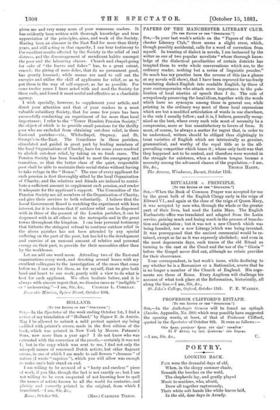PAPERS OF THE MANCHESTER LITERARY CLUB.
[To THE EDITOR OF THE "SPECTATOR.")
SIR,—In your last week's article on the "Papers of the Man- chester Literary Club," there seems a slight error, which, though possibly accidental, calls for a word of correction from myself. In treating of dialect in novels, I am instanced by the writer as one of two popular novelists "whose thorough know- ledge of the dialectical peculiarities of certain districts has tempted them to write whole conversations which are, to the ordinary reader, nothing but a series of linguistic puzzles." So much has my practice been the reverse of this (as a glance at my novels will show), that I have been reproved for too freely translating dialect-English into readable English, by those of your contemporaries who attach more importance to the pub- lication of local niceties of speech than I do. The rule of scrupulously preserving the local idiom, together with the words which have no synonym among those in general use, while printing in the ordinary way most of those local expressions which are but a modified articulation of words in use elsewhere, is the rule I usually follow ; and it is, I believe, generally recog- nised as the best, where every such rule must of necessity be a compromise, more or less unsatisfactory to lovers of form. It must, of course, be always a matter for regret that, in order to be understood, writers should be obliged thus slightingly to treat varieties of English which are intrinsically as genuine, grammatical, and worthy of the royal title as is the all- prevailing competitor which bears it ; whose only fault was that they happened not to be central, and therefore were worsted in the struggle for existence, when a uniform tongue became a necessity among the advanced classes of the population.—I am,


































 Previous page
Previous page